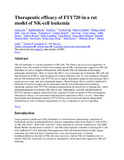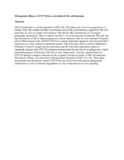| dc.contributor.author | Liao, A | |
| dc.contributor.author | Broeg, K | |
| dc.contributor.author | Fox, T | |
| dc.contributor.author | Tan, SF | |
| dc.contributor.author | Watters, R | |
| dc.contributor.author | Shah, MV | |
| dc.contributor.author | et al | |
| dc.date.accessioned | 2013-06-10T08:35:25Z | |
| dc.date.available | 2013-06-10T08:35:25Z | |
| dc.date.issued | 2011 | |
| dc.identifier.citation | Blood. 2011 Sep 8;118(10):2793-800. doi: 10.1182/blood-2011-01-331447. Epub 2011 Jul 18 | en |
| dc.identifier.uri | www.ncbi.nlm.nih.gov/whalecom0/pubmed/21768294 | |
| dc.identifier.uri | http://erepository.uonbi.ac.ke:8080/xmlui/handle/123456789/30496 | |
| dc.identifier.uri | http://www.ncbi.nlm.nih.gov/pmc/articles/PMC3172796/ | |
| dc.description.abstract | NK-cell leukemia is a clonal expansion of NK cells. The illness can occur in an aggressive or chronic form. We studied cell lines from human and rat NK-cell leukemias (aggressive NK-cell leukemia) as well as samples from patients with chronic NK-cell leukemia to investigate pathogenic mechanisms. Here we report that Mcl-1 was overexpressed in leukemic NK cells and that knockdown of Mcl-1 induced apoptosis in these leukemic cells. In vitro treatment of human and rat NK leukemia cells with FTY720 led to caspase-dependent apoptosis and decreased Mcl-1 expression in a time- and-dose-dependent manner. These biologic effects could be inhibited by blockade of reactive oxygen species generation and the lysosomal degradation pathway. Lipidomic analyses after FTY720 treatment demonstrated elevated levels of sphingosine, which mediated apoptosis of leukemic NK cells in vitro. Importantly, systemic administration of FTY720 induced complete remission in the syngeneic Fischer rat model of NK-cell leukemia. Therapeutic efficacy was associated with decreased expression of Mcl-1 in vivo. These data demonstrate that therapeutic benefit of FTY720 may result from both altered sphingolipid metabolism as well as enhanced degradation of a key component of survival signaling. | en |
| dc.language.iso | en | en |
| dc.title | Therapeutic efficacy of FTY720 in a rat model of NK-cell leukemia. | en |
| dc.type | Article | en |
| local.publisher | Penn State Hershey Cancer Institute, Pennsylvania State University College of Medicine, Hershey, PA 17033, USA | en |


